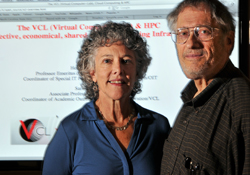Ahead in the Clouds
People still work with their hands in Pitt County, a largely agricultural community settled on rolling hills midway between North Carolina’s capital city and the Atlantic coast. But jobs are scarce in this fast growing county, where a 25 percent surge in population since 2002 has far outpaced economic opportunity.
“We’ve seen many textile mills and manufacturing plants disappear,” says Mike Clendenen, a resident since 1965.
At Pitt Community College in Winterville, where he’s director of distance learning and instructional technology, Clendenen helps students acquire new skills for a changing job market. It’s challenging work.
But thanks to cloud computing technology developed at NC State, students in one high-tech training program can now access advanced software that was previously unattainable.
Golden Opportunity
Pitt Community College leads the region in a federally-funded project to train thousands of health information technology professionals. The intensive six-month training program, offered entirely online, will help cure a shortfall of 50,000 IT workers needed by health care providers in coming years as they introduce electronic medical records systems.
The program was a no-brainer, says Clendenen, then the lead technology professional on the project. But accessing the software used in the training program was tough.

Among the 12 gigabytes of content provided by the government was an advanced simulation program allowing students to work on an actual electronic records database, the Veteran Administration’s VistA system. But, Clendenen quickly realized, the college couldn’t load the hefty program onto students’ computers nor could they ensure they’d have enough computing power to run it.
Just before the training courses launched, Clendenen met an NC State professor at an educational conference and solved his dilemma. Rather than loading a copy of the VistA program on every student’s computer, Dr. Henry Schaffer told him, he could give students access over the Internet through a pioneering cloud computing system called the Virtual Computing Lab, or VCL.
The program proved heaven sent.
“We didn’t have to spend a dime to take advantage of the system,” Clendenen notes.
The 350 students enrolled in the community college program gain hands-on access to a very sophisticated software program without worrying compatibility issues.
Born of Necessity
At NC State, the same issues drove the development of the VCL in 2004.
Josh Thompson, Andy Kurth and Aaron Peeler of the university’s Advanced Academic Computing Initiatives, and Mladen Vouk, associate vice provost for information technology and head of the Department of Computer Science, designed the system to help solve a problem in the College of Engineering.
“The engineering labs had 60 different and conflicting programs loaded onto every computer,” Schaffer explains.
“We didn’t have high-flying dreams, we just did what was needed.”
The team took some IBM computers and put them in racks. Then they wrote computer code to enable engineering students and faculty to use the computers, called blades, remotely over an Internet connection. The blades automatically load only the programs needed for each session, thereby avoiding software conflicts. When a session concludes, the blade is wiped clean, ready for the next client. Students simply save their work to a hard drive or flash drive, then log in for another session when they’re ready to continue working.
Almost immediately, the team realized they’d developed a system that could be scaled up to work across campus and across the state. They launched a pilot program to test whether all the university’s students and faculty could share a system without overloading it–they can–and then invited other universities to try it out.
Leveling the Field
The enthusiasm for the VCL is understandable. Not only does the system revolutionize distance education by allowing schools to offer highly advanced online courses, it also frees up space in on-campus computer labs as more students move to virtual labs.
In 2009, the National Science Foundation awarded $1.8 million to NC State to underwrite a project to bring dynamic mathematics software to rural, underserved high schools in North Carolina via the VCL.
VCL allows high schools in underserved areas to use industry standard software in the so-called STEM disciplines that often lead to high paying careers. Students in poor and rural districts need not be excluded simply because they can’t afford a high end computer loaded with ample memory, processing power and software programs.
That, says Schaffer, is the beauty of the mission of a land-grant university.
“When we saw that we had something that worked, our first thought was to share it,” he says. “Our first thought was for the larger world.”
The full feature “Ahead in the Clouds” appears in the fall issue of Results magazine.
- Categories:


